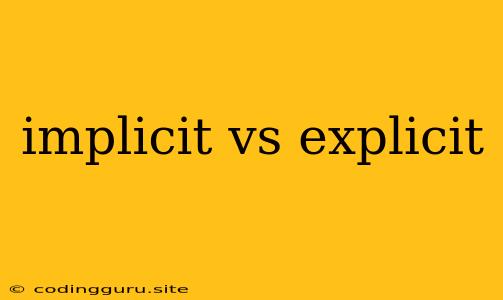Implicit vs. Explicit: Understanding the Difference
In the world of programming, clarity is key. We want our code to be easy to understand, maintain, and debug. This is where the concepts of implicit and explicit come into play. While they may sound similar, these terms represent contrasting approaches to how we handle certain aspects of our code.
What does "implicit" mean in programming?
Think of implicit as something that's implied or understood without being explicitly stated. In programming, implicit behavior relies on the compiler or interpreter to make assumptions based on the context of the code. It's like having a conversation where you understand the meaning without needing every word spelled out.
What does "explicit" mean in programming?
Explicit, on the other hand, is all about being direct and clear. It leaves no room for ambiguity. Explicit code explicitly declares and specifies every detail, leaving no room for interpretation. It's like having a conversation where everything is clearly stated and defined.
Let's break down the difference with some examples:
1. Type Declarations:
- Implicit: In some languages like Python, you don't need to explicitly declare the data type of a variable. The interpreter infers the type based on the value assigned. For example,
x = 10automatically creates an integer variable. - Explicit: In languages like Java or C++, you must explicitly declare the data type. For example,
int x = 10;explicitly definesxas an integer variable.
2. Conversions:
- Implicit: Some languages perform automatic type conversions, like converting an integer to a float when needed. This can sometimes lead to unexpected behavior if you're not aware of the implicit conversion rules.
- Explicit: In languages that require explicit conversions, you must explicitly cast one data type to another. For example,
float x = (float) 10;explicitly casts the integer10to a float.
3. Parameter Passing:
- Implicit: Some languages use call-by-reference or call-by-value implicitly. This means the parameter passing mechanism is determined by the language, not the programmer.
- Explicit: In languages that allow explicit parameter passing, you can choose between call-by-reference or call-by-value by using specific keywords or syntax.
When to choose Implicit:
- Conciseness: Implicit behaviors can make code shorter and more concise, especially for common operations.
- Readability: In some cases, implicit behaviors can make code easier to read, especially for simple data types.
- Flexibility: Implicit behaviors can provide flexibility in certain scenarios where the exact type or behavior is not critical.
When to choose Explicit:
- Clarity: Explicit code is easier to understand, especially for complex data types or operations.
- Control: Explicit code gives you more control over the behavior of your code, reducing the risk of unexpected results.
- Debugging: Explicit code makes debugging easier, as you can clearly see what's happening at each step.
Implicit vs. Explicit: A Balancing Act
The choice between implicit and explicit is not always straightforward. It often depends on the specific language, the complexity of the code, and your personal preferences as a developer. In general, it's a good practice to strive for clear and explicit code whenever possible, as it can lead to more maintainable and reliable software. However, there are situations where implicit behaviors can be beneficial for improving readability or conciseness.
Conclusion
Understanding the difference between implicit and explicit behavior is crucial for writing efficient and reliable code. While implicit behaviors can sometimes offer convenience, explicit code provides clarity and control. By choosing the appropriate approach for each scenario, you can enhance the maintainability, readability, and debuggability of your code.
